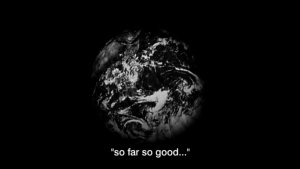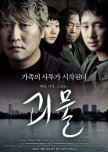A monster movie that devours its competition
The titular monster of 'The Host' starts off as a fish before mutating into an oversized amalgam of animalistic traits. Claws that have smaller claws attached, a serpentine body, a multilayered maw full of teeth and a prehensile tail. When it first attacks, it lumbers head-on like an enraged bull, but it is also capable of deception, striking from the shadows and swinging from overhead beams like a demented acrobat. Despite how its CGI is dated, the monster is not only grotesque and frightening but captivating and amusing. Much of this can also be said of 'The Host' as a movie. By definition it is a horror movie but under Bong Joon-ho's direction it morphs into dark comedy, family drama, tragedy and most notably, a barbed political allegory. Unlike the CGI, this allegory remains frighteningly relevant, even to- no, especially in this day and age.
Director Bong's satirical attack is two-pronged. The film is known widely to be a critique of America's continuous presence in South Korea. The opening scene of an American doctor forcing his South Korean colleague to pour formaldehyde in the Han river was closely inspired by an uproar-causing real-life incident, and this notion of insidious poisoning leaves little to the imagination. As does the toxic chemical agent 'Agent Yellow', which evokes a fairly recent example of American Imperialism in Asia that ultimately caused more harm than good.
What is scarily applicable to the entire world, however, is the film's depiction in portraying government incompetence; both at preventing disasters and handling them. An unfortunate number of viewers have derided this film for showing its monster 'too soon', but this seems to be the point. The government knows that chemicals are mutating the fish in the Han river, they know of rumours that their irresponsibility in letting the Americans take charge is creating a literal monster- but they do absolutely nothing. The people, without the government's warning, behave likewise- they see the beast hanging like a fruitbat from a bridge, they throw snacks at it, and they only take action when it starts devouring them. Too little, too late. Rather than making amends and assisting the victims of the disaster, the government focuses on preventing their own fall by spinning a web of lies and red tape, and using the 'infected' as quasi-scapegoats on which to deflect public blame. This tragic process has been seen time and time again in human history- most recently, with a certain pandemic that starts with 'c' and rhymes with 'coronavirus'. It is Bong's ability to spin such a relevant allegory while creating a scary and fun movie that makes him such a fantastic director- hence why this film is just so brilliant.
Brilliant, but not perfect necessarily; the film's middle act drags slightly without a monster to chase it, though its more human emphasis helps build the political allegory.
The main characters in this film were highly likeable, both in their humorous family dynamics and their steely determination to take things into their own hands. They were buoyed by the film's venerable cast. Song Kang-ho was particularly memorable as the narcoleptic Gang-du, whose dimwittedness was matched only by his unyielding devotion to his daughter and his blubbering, sincere desire for his despair to fall on sympathetic ears. Ko Asung, then a child actor, delivered an endearing performance that packed both heart-stopping fear and resourceful bravery.
The monster scenes, especially the wild chase at the start, are some of the best that I've seen and were often unexpectedly hilarious. I also enjoyed seeing how the Park family took on the monster with largely scavenged weapons; signs, old Winchesters, bows and molotov cocktails.
The theme song of 'The Host' perfectly captures the film's prevailing mood; not terror, but amusement with a melancholy tint to it.
https://www.youtube.com/watch?v=6icONTC43dI
9.5/10
Director Bong's satirical attack is two-pronged. The film is known widely to be a critique of America's continuous presence in South Korea. The opening scene of an American doctor forcing his South Korean colleague to pour formaldehyde in the Han river was closely inspired by an uproar-causing real-life incident, and this notion of insidious poisoning leaves little to the imagination. As does the toxic chemical agent 'Agent Yellow', which evokes a fairly recent example of American Imperialism in Asia that ultimately caused more harm than good.
What is scarily applicable to the entire world, however, is the film's depiction in portraying government incompetence; both at preventing disasters and handling them. An unfortunate number of viewers have derided this film for showing its monster 'too soon', but this seems to be the point. The government knows that chemicals are mutating the fish in the Han river, they know of rumours that their irresponsibility in letting the Americans take charge is creating a literal monster- but they do absolutely nothing. The people, without the government's warning, behave likewise- they see the beast hanging like a fruitbat from a bridge, they throw snacks at it, and they only take action when it starts devouring them. Too little, too late. Rather than making amends and assisting the victims of the disaster, the government focuses on preventing their own fall by spinning a web of lies and red tape, and using the 'infected' as quasi-scapegoats on which to deflect public blame. This tragic process has been seen time and time again in human history- most recently, with a certain pandemic that starts with 'c' and rhymes with 'coronavirus'. It is Bong's ability to spin such a relevant allegory while creating a scary and fun movie that makes him such a fantastic director- hence why this film is just so brilliant.
Brilliant, but not perfect necessarily; the film's middle act drags slightly without a monster to chase it, though its more human emphasis helps build the political allegory.
The main characters in this film were highly likeable, both in their humorous family dynamics and their steely determination to take things into their own hands. They were buoyed by the film's venerable cast. Song Kang-ho was particularly memorable as the narcoleptic Gang-du, whose dimwittedness was matched only by his unyielding devotion to his daughter and his blubbering, sincere desire for his despair to fall on sympathetic ears. Ko Asung, then a child actor, delivered an endearing performance that packed both heart-stopping fear and resourceful bravery.
The monster scenes, especially the wild chase at the start, are some of the best that I've seen and were often unexpectedly hilarious. I also enjoyed seeing how the Park family took on the monster with largely scavenged weapons; signs, old Winchesters, bows and molotov cocktails.
The theme song of 'The Host' perfectly captures the film's prevailing mood; not terror, but amusement with a melancholy tint to it.
https://www.youtube.com/watch?v=6icONTC43dI
9.5/10
Cet avis était-il utile?
























